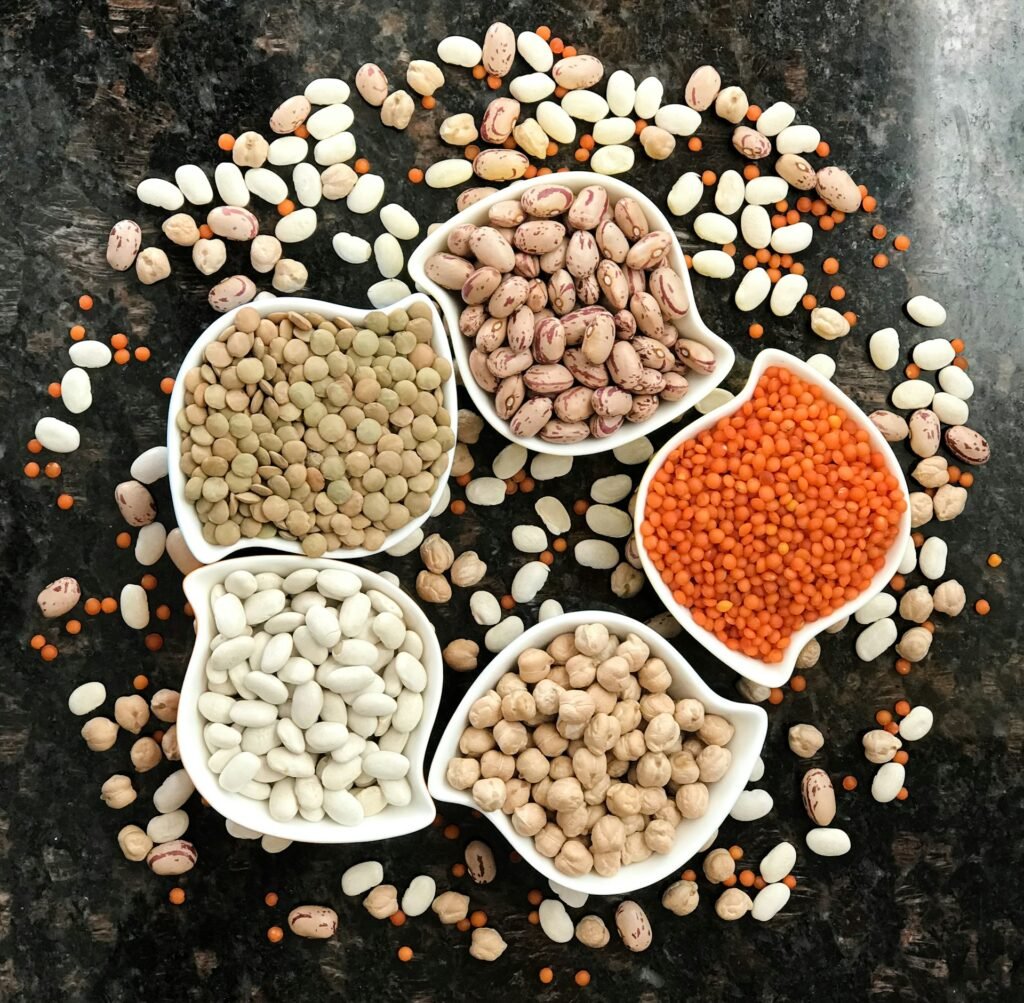
This page contains affiliate links. We greatly appreciate your support!
Introduction
By comparing the nutritional values of plant-based foods and animal products, we can make decisions that support our health and the environment. We will focus on calories, cholesterol, iron, fiber, fat, protein, and carbohydrates. Additionally, we will explore the benefits of incorporating more plant-based foods into our diets.
Nutritional Comparison
Below is a chart comparing the nutritional values of different food items:
| Food Item | Calories | Cholesterol | Iron | Fiber | Fat | Protein | Carbohydrates |
|---|---|---|---|---|---|---|---|
| Beef 100g | 250 | 80mg | 2mg | 0g | 18g | 26g | 0g |
| Chicken 100g | 165 | 85mg | 1mg | 0g | 5g | 31g | 0g |
| Fish 100g | 130 | 57mg | 1mg | 0g | 5g | 25g | 0g |
| Tofu 100g | 85 | 0mg | 2mg | 1g | 5g | 10.9g | 1.2g |
| Black Beans boiled 100g | 130 | 0mg | 3mg | 8g | 1g | 9g | 25g |
| Garbanzo Beans boiled 100g | 164 | 0mg | 2.89mg | 8g | 2.6g | 9g | 27g |
| Pinto Beans boiled 100g | 143 | 0mg | 2mg | 9g | 1g | 9g | 26g |
| Soybeans-cooked 100g | 147 | 0mg | 3.6mg | 4.2g | 6.8g | 13g | 11g |
| Lentils cooked 100g | 114 | 0mg | 3.3mg | 8g | .4g | 9g | 40g |
|
Dr. Praeger’s American Burger |
110 | 0mg | 2.9mg | 2g | 6g | 10g | 5g |
| Morningstar Farms Burger 64g | 130 | 0mg | 1.1mg | 4g | 5g | 16g | 8g |
| Impossible Burger 113g serving | 230 | 0mg | 4.2mg | 5g | 13g | 19g | 9g |
Plant-Based Foods v Animal Meat
Many of us are raised to think that animal meat is the healthiest source of protein. Once we educate ourselves about alternative sources of protein, we realize that although meat has high levels of protein, it comes with drawbacks that animal sources don’t have. Plant-based foods offer numerous benefits over animal products. They are typically lower in calories, cholesterol, and saturated fats, making them a healthier choice for maintaining a balanced diet. Additionally, plant-based foods are rich in fiber, which aids digestion and supports heart health. They are excellent sources of essential nutrients, such as iron, vitamins, and minerals.
By incorporating more plant-based foods into our diets, we can enjoy the health benefits they offer while reducing our environmental impact. Plant-based eating promotes sustainability and reduces reliance on animal agriculture, which has a significant environmental footprint. Beef makes the largest water footprint of any food on the globe. It takes about 1,850 gallons of water to produce one pound of beef and 518 gallons to produce a pound of chicken. The average American consumes 271 pounds of meat per year. Think of the water use!!!!
Another negative to the consumption of animals is that most animals are given hormones as well as antibiotics to promote growth and avoid illness. These antibiotics used in the agricultural industry have created “super” bacteria that are resistant to the human immune system. They threaten everyone, including vegetarians, since they escape farms on workers, wind, water, and other animals. There are many health concerns surrounding hormonal drugs and antimicrobials in our food animals.
Here are our recommendations for clean, organic protein:
1. *** Organic vegan unflavored, unsweetened Protein Powder plus Probiotics https://amzn.to/4dBrmqi
2. 3 lbs. organic dried garbanzo beans/chickpeas for cooking or sprouting https://amzn.to/4bfUFNk
3. 1 lb. organic dried pinto bean https://amzn.to/3WCc5iQ
4. 1 lb. organic dried black beans https://amzn.to/3yisI9a
5. 1 lb. organic red lentils https://amzn.to/4bmeXVO
6. 1 lb. organic green lentils https://amzn.to/3UZ7xSC

